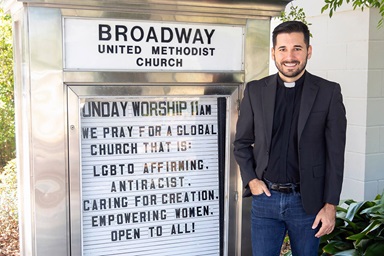Key points:
- After historic decisions reversing The United Methodist Church’s longtime restrictions against LGBTQ members, church leaders see a denomination where everyone can belong, but they also acknowledge the hard work ahead.
- The panel included Council of Bishops President Tracy S. Malone, Bishop Connie Shelton, Bishop Cedrick D. Bridgeforth, the Rev. Effie E. McAvoy and the Rev. John Stephens.
- Malone said the passing of worldwide regionalization allows each region to have its own Book of Discipline. “We had to make sure that while we're trying to move toward regionalization, we did not want to pass something that would be preventative or even harmful for the central conferences.”
Five United Methodist clergy, including three bishops, celebrated and discussed historic decisions made by the United Methodist General Conference to remove harmful and restrictive language around homosexuality.
The decisions are a “testimony” to The United Methodist Church, said Bishop Tracy S. Malone, president of the Council of Bishops.
“We are a church where everyone can belong,” she said.
The comments were made during a press conference held May 2 after the day’s business.
The panel included Malone, Bishop Connie Shelton, North Carolina Conference; Bishop Cedrick D. Bridgeforth, Greater Northwest Area; the Rev. Effie E. McAvoy, New England Conference; and the Rev. John Stephens, Texas Conference.
Shelton, who has been at every General Conference since 2004, said this General Conference was different. Those were filled with tension.
“I’m thrilled because I believe that we have practiced as United Methodists over these last nine days who we want to be,” she said. “These decisions don’t happen without prayerfulness and intentionality and listening deeply.”
On May 2, by a 523-161 vote, General Conference delegates eliminated the 52-year-old assertion in the denomination’s Social Principles that “the practice of homosexuality… is incompatible with Christian teaching.”
In the same vote, delegates affirmed “marriage as a sacred, lifelong covenant that brings two people of faith (adult man and adult woman of consenting age or two adult persons of consenting age) into a union of one another and into deeper relationship with God and the religious community.”
On May 1, General Conference voted to remove The United Methodist Church’s ban on the ordination of clergy who are “self-avowed practicing homosexuals” — a prohibition that dates to 1984.
“I celebrate and I hope every person out there who felt like they don’t belong, I pray these decisions help others know that Jesus sees you, Jesus loves you,” Shelton said.
The Rev. Effie E. McAvoy, pastor of Shepherd of the Valley United Methodist Church in Hope, Rhode Island, and a delegate, said the decisions made during this General Conference say to the world, “God loves you, the whole of you and that God’s greatest desire for you is to live into the fullness of who you were created to be.”
“Every Sunday, I give the same benediction, ‘God loves you with an everlasting love. If anybody tells you differently, they are lying to you.’”
Stephens, pastor at Chapelwood United Methodist Church in Houston, Texas, and a delegate to General Conference, said he is “a self-defined conservative.”
“I think one of the things I would say for all our United Methodist brothers and sisters is there are different kinds of conservatives.”
The language that has been in the church’s lawbook for a half-century was not just restrictive but it was also condemning, he said.
“What we are doing is making the church look more like what the kingdom of God looks like,” he said.
Removing the condemning language opens the church up to be in a worldwide conversation, Bridgeforth said.
Subscribe to our
e-newsletter
“It allows us to lead with greater integrity as clergy and laity,” he said. “And we can actually say with greater confidence that we welcome all and that The United Methodist Church is a place for all.”
The hard work will happen in the local church, Malone said.
Bridgeforth said he hopes those who work in local churches, boards of ministries and cabinets “will not grow weary in well-doing” because these decisions made at General Conference will call for a cultural shift and hard conversations.
Another piece of legislation the conference passed was worldwide regionalization.
There will ultimately be a general Book of Discipline containing things that are not changeable, but every region will have its own Book of Discipline, Malone explained, adding that the Social Principles are for the whole church.
“And so we had to make sure that while we're trying to move toward regionalization, we did not want to pass something that would be preventative or even harmful for the central conferences,” she said, referring to church regions in Africa, Europe and the Philippines.
“For the most part, the greater part of Africa plans to remain United Methodist and carry the Cross and Flame,” she said.
Malone said many people left the church because of the harmful language, clergy and laity alike — especially younger people. She also said there are people who are more traditional that left because they got tired of the fighting.
“I am hoping those people will come home.”
Gilbert is a freelance reporter in Nashville, Tenn. News media contact: Julie Dwyer at (615) 742-5470 or [email protected]. To read more United Methodist news, subscribe to the free daily or weekly Digests.





